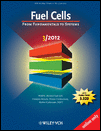
Fuel Cells
metrics 2024
Innovating Energy Solutions: The Heart of Fuel Cell Research.
Introduction
Fuel Cells is a leading academic journal published by WILEY-V C H VERLAG GMBH that focuses on the advancements in the field of energy engineering, particularly the development, research, and application of fuel cell technologies. With its ISSN 1615-6846 and E-ISSN 1615-6854, this journal serves as an essential resource for researchers, professionals, and students dedicated to enhancing sustainable energy solutions. The journal has established itself as a significant contributor to the academic community, currently classified in Q2 of two pivotal categories: Energy Engineering and Power Technology and Renewable Energy, Sustainability and the Environment. Ranked within the top 30% of its fields, it boasts impressive Scopus Ranks, being positioned #84 out of 272 and #111 out of 270 in relevant sectors. Although it does not operate under an open-access model, its commitment to rigorous peer review and the dissemination of high-quality research from 2003 to 2024 ensures that it continues to be a vital platform for innovation in energy technologies.
Metrics 2024
 0.57
0.57 2.60
2.60 3.00
3.00 78
78Metrics History
Rank 2024
Scopus
IF (Web Of Science)
JCI (Web Of Science)
Quartile History
Similar Journals
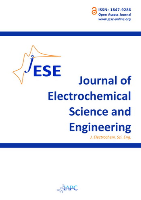
Journal of Electrochemical Science and Engineering
Empowering Global Collaboration in Electrochemical Science.The Journal of Electrochemical Science and Engineering, published by the International Association of Physical Chemists (IAPC), serves as a vital resource for researchers and professionals in the fields of electrochemistry, materials chemistry, and chemical engineering. With an Open Access model since 2011, this journal ensures that groundbreaking research is freely accessible to a global audience, promoting collaboration and knowledge sharing. Situated in Croatia, it showcases cutting-edge developments while focusing on applied aspects related to electrochemical technologies. Notably, the journal holds a commendable Scopus ranking, placing it within the Q3 quartile for multiple categories, including Chemical Engineering (miscellaneous) and Electrochemistry. By fostering innovative research and comprehensive reviews, the Journal of Electrochemical Science and Engineering plays a crucial role in advancing the understanding and application of electrochemical processes, making it an indispensable platform for academics and practitioners alike.
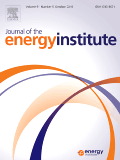
JOURNAL OF THE ENERGY INSTITUTE
Empowering Knowledge for a Greener TomorrowJOURNAL OF THE ENERGY INSTITUTE, published by Elsevier Science Ltd, is a leading interdisciplinary journal dedicated to the advancing fields of energy engineering and technology. With its ISSN 1743-9671 and E-ISSN 1746-0220, this journal has established a prominent reputation, evident from its impressive impact factor and strong rankings across multiple categories, achieving Q1 status in fields such as Condensed Matter Physics, Control and Systems Engineering, and Energy Engineering and Power Technology. As a pivotal resource for researchers, professionals, and students alike, the journal covers a comprehensive spectrum of topics in energy, including recent innovations in renewable energy technologies, sustainable practices, and advancements in fuel technologies. Researchers are encouraged to explore its open-access options for broad dissemination of knowledge, contributing to a more sustainable and energy-efficient future. With a converged history from 2004 to 2024, the JOURNAL OF THE ENERGY INSTITUTE remains a critical platform for cutting-edge research and development in the energy sector, promoting impactful solutions to global energy challenges.
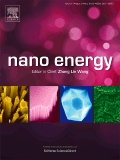
Nano Energy
Exploring the Future of Energy at the NanoscaleNano Energy is a premier journal published by Elsevier, focused on the dynamic intersection of nano-technology and energy solutions. Since its inception in 2012, this high-impact journal has made significant strides in advancing research across multiple disciplines, showcasing groundbreaking studies in Electrical and Electronic Engineering, Materials Science, and Renewable Energy. With an impressive Impact Factor that places it in the Q1 category of these fields—including a distinguished rank of #6 in Electrical Engineering and #9 in Renewable Energy on Scopus—the journal serves as a vital resource for academics and practitioners alike. Nano Energy aims to disseminate innovative research and developments that contribute to the sustainable energy landscape, thereby addressing pressing global energy challenges. Researchers and professionals seeking to stay at the forefront of nanotechnology applications in energy generation and efficiency will find this journal an indispensable platform for sharing knowledge and driving impact.

Energy & Environmental Materials
Catalyzing Change through Cutting-Edge ResearchEnergy & Environmental Materials, published by WILEY, is an esteemed academic journal dedicated to pioneering research in the multifaceted domains of energy, environmental science, and materials science. Since its inception in 2018, this journal has rapidly established itself as a leading platform, holding a prestigious Q1 ranking across multiple categories including Renewable Energy, Sustainability, and Waste Management, reflecting its significant contributions to advancing knowledge in these critical areas. With a robust Scopus ranking that positions it in the top percentile for Environmental Science and Materials Science, it caters to a diverse audience of researchers, professionals, and students seeking cutting-edge findings and practical applications in energy efficiency and sustainable materials. This open-access journal facilitates the dissemination of innovative research and aims to bridge the gap between scientific exploration and real-world solutions for a sustainable future. The editorial team encourages submissions that explore both theoretical and practical aspects, ensuring that every publication not only contributes to the academic landscape but also drives impactful change in energy and environmental practices.
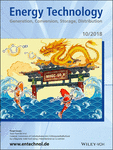
Energy Technology
Pioneering Insights into Renewable Energy AdvancesEnergy Technology, published by Wiley-VCH Verlag GmbH, is a prominent peer-reviewed journal dedicated to advancing the field of energy research and technology. With an ISSN of 2194-4288 and an E-ISSN of 2194-4296, this journal has made a significant impact in the energy sector, holding a Q2 category ranking in the Energy (miscellaneous) category for 2023, and proudly positioned in the 77th percentile within the Scopus ranking for General Energy. Since its inception in 2013, Energy Technology has consistently published cutting-edge research, innovations, and reviews that cater to a wide array of topics including renewable energy, sustainable technologies, and energy efficiency. The journal does not offer open access, yet it remains a key resource for researchers, professionals, and students who are committed to exploring the dynamic field of energy. The journal's efforts to disseminate rigorous scholarship make it an invaluable asset for anyone looking to contribute to or understand the future of energy-related technologies until 2024.

INTERNATIONAL JOURNAL OF ENERGY RESEARCH
Empowering innovation in energy research and technology.INTERNATIONAL JOURNAL OF ENERGY RESEARCH (ISSN: 0363-907X; E-ISSN: 1099-114X), published by Wiley-Hindawi, stands at the forefront of energy research, offering a scholarly platform pivotal for advancing knowledge in the fields of energy engineering, nuclear energy, fuel technology, and renewable energy systems. With an impressive Q1 and Q2 ranking across several categories as of 2023, this journal reflects a commitment to high-quality, peer-reviewed research that addresses both theoretical and practical challenges in the energy sector. Now an Open Access journal since 2023, it enhances accessibility and dissemination of cutting-edge research to a global audience. Located in the United Kingdom, with an active publication history dating back to 1977, the journal aims to contribute to sustainable energy solutions and innovative technologies. Researchers, professionals, and scholars will find valuable insights and discussions here, bridging gaps in energy research and policy-making.
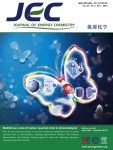
Journal of Energy Chemistry
Leading the Charge in Electrochemical InnovationThe Journal of Energy Chemistry, published by Elsevier, is a premier international journal that has established itself at the forefront of research in the fields of electrochemistry and energy technology. With an impressive impact factor, this journal is classified in the Q1 quartile across multiple categories including Energy Engineering and Power Technology, Fuel Technology, and Electrochemistry, underscoring its significant contribution to advancing knowledge and innovation in energy systems. Based in the Netherlands, the journal offers open access to its cutting-edge research, allowing for broad dissemination and engagement among researchers, professionals, and students alike. The scope of the journal spans crucial topics from chemical energy storage to sustainable energy solutions, making it an essential resource for those looking to understand and contribute to the evolving landscape of energy chemistry.

Journal of Power Sources Advances
Unleashing Potential in Energy Engineering and Materials ChemistryJournal of Power Sources Advances, published by ELSEVIER, stands at the forefront of innovative research within the fields of Electrochemistry, Energy Engineering and Power Technology, and Materials Chemistry. Having established itself as an Open Access journal since 2020, it aims to disseminate knowledge rapidly and widely among researchers, professionals, and students interested in the latest advancements in power sources technology. With an impressive impact factor and recognition as a Q1 journal in 2023 across multiple categories, it addresses key challenges and innovations in energy generation, storage, and materials development. The journal's commitment to high-quality, peer-reviewed content fosters a vibrant community for discussing breakthroughs that hold the potential to transform energy systems globally. The journal operates out of the Netherlands, enhancing its global outreach, while its strong Scopus rankings highlight its influential role in driving research within its scope. Journal of Power Sources Advances is the pivotal resource for those dedicated to shaping the future of energy sustainability and technology.

Carbon Energy
Catalyzing interdisciplinary collaboration for global energy challenges.Welcome to Carbon Energy, an esteemed open-access journal published by WILEY that focuses on cutting-edge research in the field of energy and materials science. Since its inception in 2019, this journal has quickly established itself as a leading platform for disseminating impactful findings and innovations related to carbon-based energy solutions, renewable resources, and sustainability practices. With its impressive Q1 rankings in multiple categories—including Energy (miscellaneous), Materials Chemistry, and Renewable Energy—Carbon Energy is recognized for delivering high-quality, peer-reviewed content that meets the rigorous standards of the academic community. Through its open-access model, the journal ensures wide accessibility of research findings, making it an invaluable resource for researchers, professionals, and students alike. As we look toward the future, Carbon Energy aims to further its mission of advancing sustainable energy technologies and promoting interdisciplinary collaboration in tackling global energy challenges.
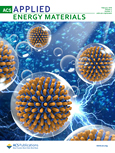
ACS Applied Energy Materials
Pioneering Research for a Sustainable Energy TomorrowACS Applied Energy Materials, published by the American Chemical Society, is a premier journal dedicated to the cutting-edge fields of energy materials, chemical engineering, and electrochemistry. With an impressive impact factor and consistently ranked in the Q1 category across multiple disciplines—including Chemical Engineering, Electrical and Electronic Engineering, and Materials Chemistry—this journal serves as a pivotal platform for researchers and professionals focused on innovative solutions for energy systems and materials science. Since its inception in 2018, ACS Applied Energy Materials has been committed to disseminating high-quality research that addresses pressing energy challenges, promoting sustainability and efficiency in various applications. Its competitive Scopus rankings reflect the journal's influence and relevance within the academic community, making it an essential resource for anyone looking to stay at the forefront of energy materials research.